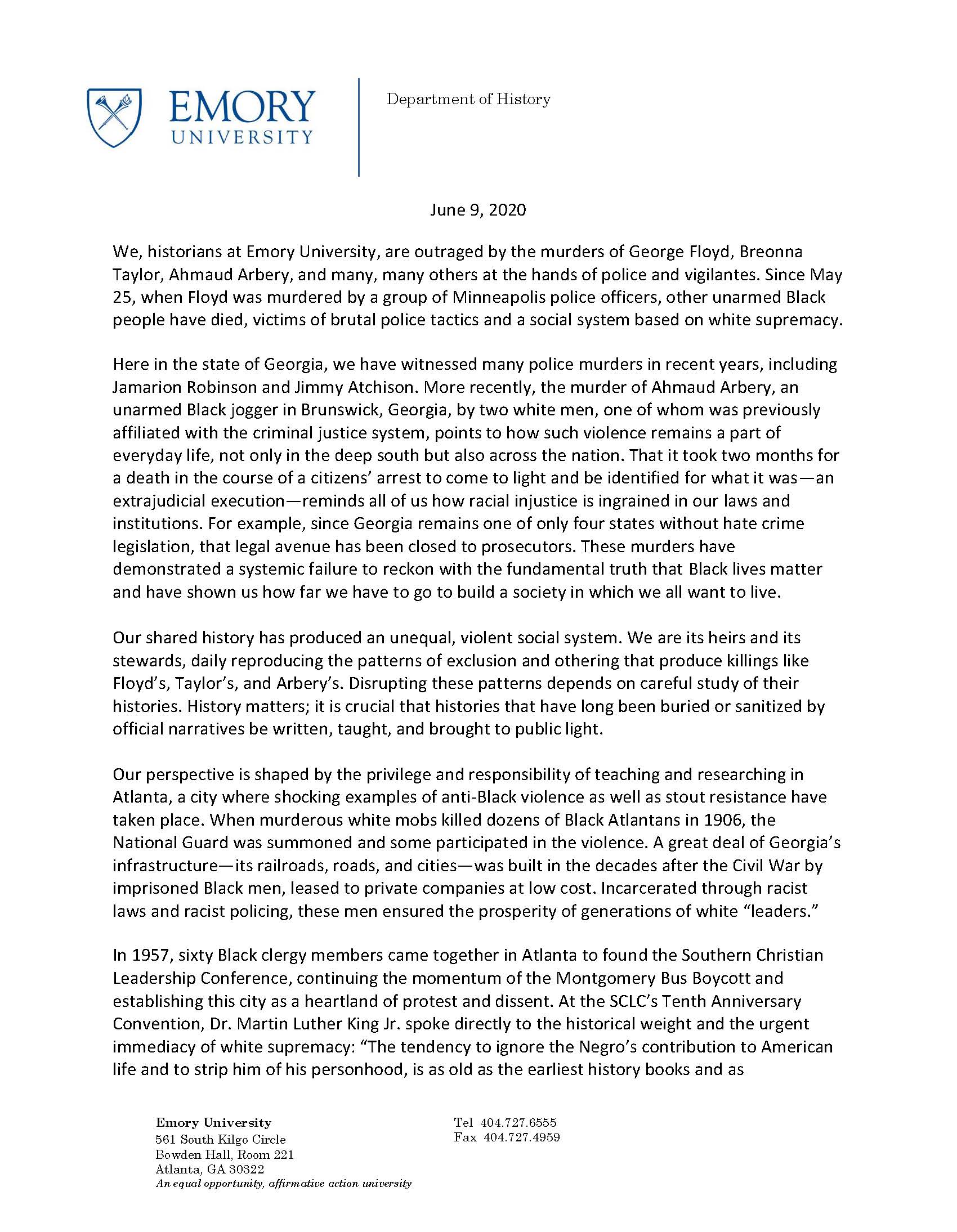A statement, dated June 9, 2020, from Emory historians on police violence and white supremacy:
“We, historians at Emory University, are outraged by the murders of George Floyd, Breonna Taylor, Ahmaud Arbery, and many, many others at the hands of police and vigilantes. Since May 25, when Floyd was murdered by a group of Minneapolis police officers, other unarmed Black people have died, victims of brutal police tactics and a social system based on white supremacy.
Here in the state of Georgia, we have witnessed many police murders in recent years, including Jamarion Robinson and Jimmy Atchison. More recently, the murder of Ahmaud Arbery, an unarmed Black jogger in Brunswick, Georgia, by two white men, one of whom was previously affiliated with the criminal justice system, points to how such violence remains a part of everyday life, not only in the deep south but also across the nation. That it took two months for a death in the course of a citizens’ arrest to come to light and be identified for what it was—an extrajudicial execution—reminds all of us how racial injustice is ingrained in our laws and institutions. For example, since Georgia remains one of only four states without hate crime legislation, that legal avenue has been closed to prosecutors. These murders have demonstrated a systemic failure to reckon with the fundamental truth that Black lives matter and have shown us how far we have to go to build a society in which we all want to live.
Our shared history has produced an unequal, violent social system. We are its heirs and its stewards, daily reproducing the patterns of exclusion and othering that produce killings like Floyd’s, Taylor’s, and Arbery’s. Disrupting these patterns depends on careful study of their histories. History matters; it is crucial that histories that have long been buried or sanitized by official narratives be written, taught, and brought to public light.
Our perspective is shaped by the privilege and responsibility of teaching and researching in Atlanta, a city where shocking examples of anti-Black violence as well as stout resistance have taken place. When murderous white mobs killed dozens of Black Atlantans in 1906, the National Guard was summoned and some participated in the violence. A great deal of Georgia’s infrastructure—its railroads, roads, and cities—was built in the decades after the Civil War by imprisoned Black men, leased to private companies at low cost. Incarcerated through racist laws and racist policing, these men ensured the prosperity of generations of white “leaders.”
In 1957, sixty Black clergy members came together in Atlanta to found the Southern Christian Leadership Conference, continuing the momentum of the Montgomery Bus Boycott and establishing this city as a heartland of protest and dissent. At the SCLC’s Tenth Anniversary Convention, Dr. Martin Luther King Jr. spoke directly to the historical weight and the urgent immediacy of white supremacy: “The tendency to ignore the Negro’s contribution to American life and to strip him of his personhood, is as old as the earliest history books and as contemporary as the morning’s newspaper.” Yet while Black contributions to our nation remain buried, monuments to white supremacy are still standing in the obelisks and statues erected to the “lost cause,” and a new Jim Crow is evident in unequal access to education, housing, health, and well-being.
These structures built around Black exclusion provide a model for the marginalization of other populations of color, including Georgia’s growing LatinX, immigrant, and undocumented populations. Georgia is one of four deep south states that bans undocumented students from select public institutions of higher learning. This is a painful irony given that especially in the last three decades, Georgia has become a gateway state to global refugees and migrants. History helps us to identify these processes of exclusion and the movements that have been built to resist and change them.
We recognize our obligation as historians, no matter our regional or chronological field, is to expose the racist underpinnings of our society. We also recognize that the time has come to move beyond words and the ivory tower. We must take concrete actions in the multiple ways available to us as citizens of the world to promote racial justice and equality in our wider communities. This is a shared task with our students, staff, and colleagues, one critically informed by a clear, unflinching engagement with history. We commit to strengthening our curriculum around these imperatives and to creating spaces of inclusion at our institution. We also pledge to support programming that builds community, highlights social inequities, and identifies concrete steps forward. Though our student body is increasingly diverse, Emory remains a predominantly white institution. We commit to opening paths for Black students, faculty, staff, and workers.
For resources on Emory’s campus:
Emory Office for Racial and Cultural Engagement http://race.emory.edu/
James Weldon Johnson Institute for the Study of Race and Difference http://jamesweldonjohnson.emory.edu/home/
Office of Diversity, Equity, and Inclusion http://equityandinclusion.emory.edu/
Walter L. Adamson
Patrick N. Allitt
Kathryn Amdur
Tonio Andrade
Michelle Armstrong-Partida
Susan Youngblood Ashmore
Thomas S. Burns
Adriana Chira
Clifton Crais
Joseph Crespino
Leroy Davis, Jr.
Deborah Dinner
Mary Dudziak
Astrid M. Eckert
Alison Collis Greene
Judith Evans-Grubbs
Eric L. Goldstein
Elizabeth S. Goodstein
Lakesia Hayes
Becky Herring
John T. Juricek
Daniel LaChance
Ruby Lal
Jeffrey Lesser
Kristin Mann
Roxani Margariti
James Van Horn Melton
Judith A. Miller
Maria R. Montalvo
Mary E. Odem
Gyan Pandey
Elizabeth Pastan
Cynthia Patterson
Matthew J. Payne
Jonathan Prude
James L. Roark
Thomas D. Rogers
Allison Rollins
Walter C. Rucker
Teemu Ruskola
Tehila Sasson
Ellie R. Schainker
Pamela Scully
Kylie M. Smith
Kenneth W. Stein
Karen Stolley
Sharon Strocchia
Carl Suddler
Chris Suh
Allen Tullos
Brian E. Vick
Javier Villa-Flores
Jason Morgan Ward
Katie Wilson
Yanna Yannakakis”
Click the image below to view a PDF version of the statement.
